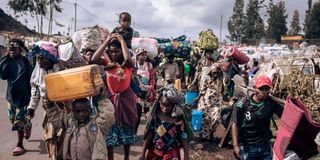Come to our rescue, DRC women cry out

War-displaced people flee towards the city of Goma, eastern Democratic Republic of Congo, on November 15, 2022.
What you need to know:
- The war in DRC has grossly affected the five provinces of North Kivu, South Kitu, Ituri, Tanganyika and Maniema.
- The UN reports indicate that the conflict has recorded one of the largest humanitarian crises in Africa.
- Congolese President Felix Tshisekedi warned that regional tensions could escalate into a full-blown war if the situation is not contained.
Tears flowing freely down their cheeks, women from the Democratic Republic of Congo (DRC) on Wednesday expressed just how badly war is ravaging their land with no signs of ending soon.
Should nothing of great magnitude be done to end the killings and plunder going on in eastern DRC, the women fear that generations will be wiped out and the immense resources in their region carted away to other countries, leaving their people destitute.
This emerged during a meeting convened by the African Women’s Development and Communications Network (Femnet), where women from the DRC, including nominated lawmaker Josephine Odira Sinyo, met with their Kenyan counterparts, including leaders from several women-led civil society groups such as the Association of Media Women in Kenya (Amwik), Echo Network Africa, Mzalendo Trust, Crisis Action, and Polycom Development Project.
Also present were women political leaders, including Nairobi Woman Representative Esther Passaris and Zipporah Kittony.
The ongoing war in DRC has grossly affected the five provinces of North Kivu, South Kitu, Ituri, Tanganyika and Maniema and has seen at least 300,000 people displaced and caused massive deaths. The United Nations reports indicate that the conflict has recorded one of the largest humanitarian crises in Africa, with Congolese President Felix Tshisekedi warning that regional tensions could escalate into a full-blown war if the situation is not contained.
Politically motivated
Femnet executive director Memory Muchambwa said the conflict is politically motivated “with everyone, including the West and African countries” scrambling for DRC’s immense natural minerals.
“At the centre of DRC are people who depend on the resources from their soil, yet they do not enjoy the proceeds of their own minerals. Often, it is men who start the war, taking our children with them and destroying generations. As women, we cannot be silent, we demand peace,” she said.
“It is high time women delegates were involved in the negotiation for peace and ensure the end result will be reparation, reconciliation and healing.”
Ammy Modi, a committee member of the African Leaders Network in the DRC, expressed her concern over how the world has largely ignored the troubles of eastern Congo, which, two decades later, is threatening to turn into a much bigger conflict that could lead to deaths of thousands if nothing is done. Sadly, women and children, often left at home when the men go to protect their families in the field, bear the brunt.
“With men out in the fields to protect their families, women are left destitute without access to clean water. Some even walk up to 100 kilometres in search of food and water and they pay the cost of war with their bodies when they chance upon the fighters who rape and defile them. At times they are killed,” she said.
An emotive presentation displayed the deplorable conditions of the filled refugee camps, including the largest one, Kanyaruchinya, in Goma, where women and children go for days without food, water and suffer different ailments without treatment or medicine.
The indiscriminate killings, the sentiment of being left alone in their suffering by the world and the abandonment of survivors negatively affected by the war are some of the points that hurt the women most, Ms Ammy said, after compiling the women’s grievances in a brief round-table discussion.
“We plead with our fellow African countries, especially our fellow sisters from across the continent, to do all they can to salvage our situation in the DRC. Things are bad,” she said.
Massive rights violation
For her, UN Women deputy counsel Catherine Odimba described the horrid times in her country when women living in war see their children being killed and their rights being violated. “We are talking of women who have no place to live, women who not only see their children, parents but also their grandparents dying before them. These are women who have no strength to talk or the energy to cry. Their lives are terrible.”
Since the victims of war cannot speak of their horrors, the UN boss called on the women leaders and women-led organisations in attendance to speak for them and use their positions of influence to voice their issues and mobilise more leaders and resources for the victims.
With conflict often resulting in rape and defilement for a majority of women, Ms Passaris said the time for action to end the chaos in the DRC is now. “I want you to know that Kenya is committed to peace. Often, when negotiating, we miss the real issues, the humanitarian issues. We must stand with our fellow women in Africa and I will bring up this matter in the Pan-African parliament where I am a member,” she said.
The women also requested Ms Passaris’ intervention to help them meet with former President Uhuru Kenyatta, who is leading the peace talks between warring parties in the DRC, to relay their demands. They prioritised peace, reparation, increasing women’s access to resources to empower themselves and the safety of women and children.
On behalf of women journalists, the Amwik executive director Patience Nyange pledged to use the media to amplify and sustain the conversation around the plight of the Congolese people affected by the war.





